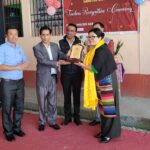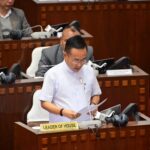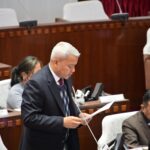Summit Report, Gangtok 26 Mar:
Chief Minister PS Tamang today expressed that the State government has taken proactive steps at various administrative and institutional levels to address the socioeconomic, medical, and psychological factors contributing to the decline in Total Fertility Rate in Sikkim.
While presenting the General Budget 2025-26 here today, he said development and progress hold no meaning if the well-being of the citizens was not safeguarded.
“Today, Sikkim faces an unprecedented demographic challenge with the Total Fertility Rate [TFR] plummeting by 129% over the past two decades- from 2.75 in 1998-99 to a critically low 1.1 in 2019-21, far below the replacement level of 2.1. This alarming decline poses a serious threat to the state’s socio-economic stability and demands immediate and comprehensive intervention,” he said.
Recognizing the urgency of the situation, he expressed, the government has taken proactive steps at various administrative and institutional levels to address the socioeconomic, medical, and psychological factors contributing to this crisis.
He added that a formal appeal was made to the Ministry of Health & Family Welfare and the Indian Council of Medical Research [ICMR] in March 2023, seeking central support which was approved and granted.
He informed that to ensure a structured and coordinated approach, an Inter-Departmental Working Group [IDWG] was constituted on 16 June 2023, reinforcing the whole-of-government approach and an Expert Group Meeting was held bringing together national and state-level stakeholders to identify research priorities and outline an actionable strategy to combat declining fertility.
“We are now implementing a range of targeted interventions, guided by expert recommendations. A midterm evaluation of the Vatsalaya Scheme is being conducted by Sikkim University to assess its impact and propose enhancements. In collaboration with the World Health Organization, an extensive Information, Education, and Communication [IEC] campaign has been launched to raise awareness about fertility issues and reproductive health,” he said.
The CM informed that a Memorandum of Understanding is being finalized with AIIMS, New Delhi, and the Army Hospital [Research and Referral], New Delhi, to establish an Assisted Reproductive Technology [ART] Centre equipped with IVF and IUI facilities.
Meanwhile, the National Institute of Research on Reproductive and Child Health [NIRRCH], a key ICMR institute, is conducting a detailed study to identify the specific factors affecting fertility rates in Sikkim and recommend targeted interventions.
Further strengthening healthcare infrastructure, he added, a dedicated Reproductive Medicine Unit has been established at STNM Hospital, Gangtok, through a notification issued on 17 October 2024 and was followed by the operationalization of a Level 1 Assisted Reproductive Technology [ART] Unit at STNM Hospital on 08 March 2025, marking a major milestone in our efforts to provide accessible reproductive health services to the people of Sikkim.
CM also informed that under Sikkim Integrated Service Provision & Innovation for Reviving Economics [INSPIRES] the government has also taken the responsibility of ensuring holistic well-being while driving socio-economic progress across multiple sectors.
He added that through INSPIRES, the government has collaborated with the Centre for Mental Health Law and Policy, Pune, to formulate a State Mental Health and Suicide Prevention Strategy.
It is informed that the first draft of this critical document has been prepared after extensive multi-stakeholder consultations and this strategy, based on evidence and tailored to Sikkim’s unique mental health landscape, will guide the state in implementing effective interventions to tackle mental health challenges holistically.
He added that each district will develop its own Integrated Economic Inclusion Action Plan [IEIAP], known as the Samridha District Plan.
“These plans will identify unique economic opportunities within each district and create structured, time-bound strategies to develop local industries and employment opportunities, particularly for women and youth. Given that Sikkim INSPIRES follows a Programme for Results model, implementation and investments will be monitored by the State Government, the World Bank, and an Independent Verification Agency to ensure efficiency and transparency,” he adds.
CM mentioned that recognizing the need for global workforce integration, the government was working towards establishing a streamlined system for securing overseas employment, particularly in the healthcare sector.
As part of this effort, he added, 13 nurses from Sikkim have already been employed in Germany’s healthcare industry with competitive remuneration. He further added moving forward, the Niyukti Kendra under the Skill Development Department will be further strengthened to facilitate high-quality employment opportunities for our workforce, particularly women and youth.
Additionally, he informed, under the Sikkim INSPIRES programme, strong emphasis on eco-tourism, community tourism and village tourism is given. In the first phase of the program, four major eco-tourism sites have been identified for development, which includes Dzongri-Goechala Trek and Thalung-Kussong Lake Trek in Mangan District, Pangolakha Trek in Pakyong District and Barsey Uttarey Trek in Soreng District.
“These eco-tourism initiatives will be integrated with economic development plans for nearby communities to ensure maximum benefits for local populations,” he said.
CM mentioned that efforts were being made to introduce an online permit and site management system, allowing tourists to make informed travel decisions while helping the government regulate footfall in ecologically sensitive areas.
“As we transition towards paperless governance, IT infrastructure plays a vital role in ensuring efficiency. Our government, through the Department of Information Technology, is spearheading the development of a State Data Policy to enable seamless data exchange and improved internet connectivity across the state. A comprehensive assessment of Sikkim’s digital infrastructure is underway to design targeted interventions that eliminate connectivity barriers and enhance digital governance,” he adds.





